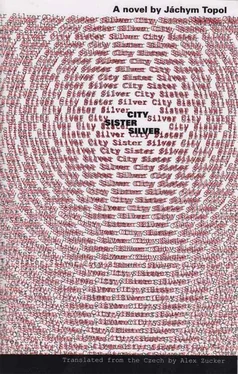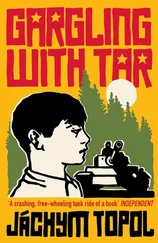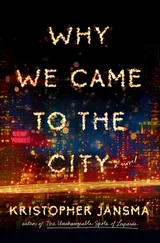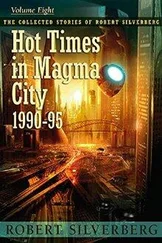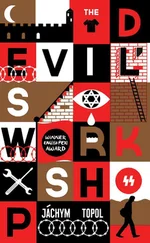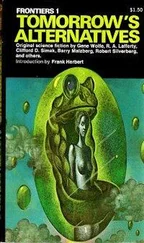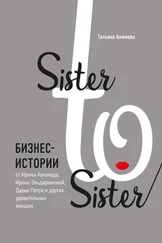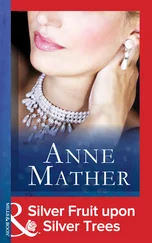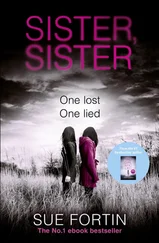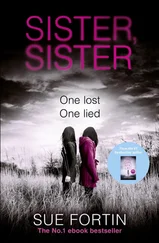Let’s not leave each other anymore.
Not anymore, you said.
And just then the doorbell rang. You jerked, I didn’t even ask … I could see in your eyes you didn’t know. The ringing wouldn’t let up. Whoever it was was holding his finger on the button. A little … just a little, I pushed you away an lifted my hands … but you took them, lightly, took my palms in yours, and laid them on your shoulders.
Let’s not open it, you said. Not anymore.
No. Not now.
19. German for “Hands up, Faster, swine, Look out, mines, Work will set you free [the slogan posted over the entrance to Auschwitz], Come fuck, my love.”
21. The Church of Our Lady Victorious, the first Baroque building in Prague; it houses the pražké Jezulatko, or Bambino di Praga, a wax effigy revered throughout the Catholic world and especially in South America.
22. Státni bezpečnost (State Security), Communist Czechoslovakia’s secret police.
23. German for “The Unknown,” as in “the unknown soldier.”
24. 1938 book by Bonn, who died in Terezín (see note for p. 63)
27. German for “I am a foreigner.”
34. With the disintegration of the Roman Empire, in the fifth century A.D. eastern tribes launched a series of raids into Central Europe. First came the Huns, followed by the Avars, who were then pushed out by Slavic tribes from east of the Carpathians.
36. A combination of Josef Stalin’s full name with the name of the main character of Jaroslav Hašek’s extremely popular humorous novel The Good Soldier Švejk (1923).
46. A play on My Sweet Little Village (1985), a film comedy about a village idiot, directed by Jiří Menzel and nominated for an Oscar. Libuše Šafránková was the female lead.
48. A statement released in January 1977 calling on the Communist government of Czechoslovakia to abide by the human rights provisions of the Helsinki Accords.
52. The Lučans, People of the Bow, were an ancient Slavic tribe that once inhabited the Czech Lands. Defeated in battle by the people we now know as Czechs.
Čech: The mythical original Czech. His name means “Czech” in Czech.
56. Karel Hynek Mácha(1810–1836), famed for his lyrical-epic work Máj (May, 1836), which scandalized his contemporaries but is now regarded as having been the starting point of a new direction in Czech poetry.
58. A reference to the story “Footprints” by Czech author Karel Čapek(1890–1938), from his Tales from Two Pockets (1929).
64. Terezín: Concentration camp in northern Bohemia set up by Nazis to fool outsiders into believing that conditions in the camps were basically good. Prisoners were transported on to other camps.
Batas:Named for Tomáš Bat’a, who founded the company in the Moravian town of Zlin in 1894.
65. toyfil: From the German Teufel, “devil.”
toluene: a liquid solvent sniffed like airplane glue.
67. Ribannawas an Apache heroine from the writings of Karl May (1842–1912), a German author best known for his series of popular novels set in the American West, although he also wrote about Arabia and Turkey. Though his works have sold nearly 100 million copies in Europe, he remains virtually unknown in the U.S.
76. Warriors of the Southern Cheyennes. Also the name of a popular band led by the author’s younger brother, Filip Topol. In the group’s early days, the author wrote their lyrics.
78. Lady Midday, the Midday Witch. Seen at the hottest time of a summer day. Also the personification of sunstroke.
82. Maryša:the title of a play by Alois (1861–1925) and Vilém (1863–1912) Mrštík about a village girl who is forced to wed a rich man she despises. She murders him by pouring poison in his coffee.
Josef Lada, illustrator of The Good Soldier Švejk (see note for p. 35), also known for his folksy calendar illustrations.
93. According to folk custom, lit during storms or at the bedside of a dying person.
97. Characters from Hunters of the Woolly Mammoth, a children’s book by Czech writer Eduard Štorch.
101. Josef NovákCzech equivalent of John Doe.
Žižkov: A working-class neighborhood in Prague.
102. The Protectorateof Bohemia and Moravia, an occupation government established by the Nazis on March 15, 1939.
Adinka: Adina Mandlová, Czech film actress, possibly a lover of Goebbels’. Her memoir was called / Laugh About It Now (Dnes uz se tomu směju).
103. German for “Heil Hitler, my officers and doctors and scholars. I’m a little Czech swine, born from Žižkov.” Note: this is not proper German.
105. Karel Poláček: popular Czech Jewish novelist, journalist, humorist (1892–1944).
109. A phrase coined between the two world wars to boost the morale of craftspeople and designers at a time of increasingly machine-driven production.
111. Czech for “Falcon,” the name of a Czech patriotic and gymnastic society founded in 1862.
120. Emil Háchawas the Czech president under the Protectorate (see note for p. 101).
122. Andrei Chikatilo, a.k.a. the Soviet Hannibal Lecter. Estimated to have killed 52 people, mostly young boys, between 1980 and 1992.
124. We Were Five (1946, posthumous) is the title of a popular novel by Czech writer Karel Poláček (see note for p. 104) about a group of five boys growing up in a small town.
130. gotwaalds: A play on Klement Gottwald (1896–1953), the first Communist president of Czechoslovakia.
Jaroslav Foglar(1907–1999), author of a popular illustrated adventure series called Speedy Arrows. His advocacy of the scouting movement led the Communists to prevent him from publishing for many years.
Kcharal ben May: A play on Karl May (see note for p. 66).
132. Myslivec: “Huntsman,” a cheap Czech brandy.
In Czech Potok means “ brook.”
141. Towns in northern Bohemia.
142. At the end of World War II, Czechoslovakia’s three million Germans, most of whom lived along its northern and western borders (known as the Sudetenland), were forcibly expelled. This process was preapproved by the Allied powers at the Potsdam Conference and officially referred to as a “transfer.” The Czechoslovak government, in a move supported by every political party and the overwhelming majority of the population, seized the Germans’ property and redistributed large portions of it to Czechs and Slovaks. To this day the expulsion remains a highly charged and emotional issue in Czech-German relations.
143. In Czech Černáis the feminine form of the adjective “black.” It is also the female form of the common surname Černý.
144. Semion Budenny(1883–1973), a Soviet field marshal.
145. Normally dylina, a Romany word meaning “idiot,” “jerk,” “asshole.”
149. Moravian: Reference to Sigmund Freud, who was born in the north Moravian town of Příbor, known as Freiberg to German speakers.
Romul: A play on Jan Ruml, minister of the interior for Czechoslovakia and then the Czech Republic, 1992–1997.
161. A play on Topol’s first collection of poems, I Love You Madly (1991). The original samizdat edition of 1988 won the Tom Stoppard Prize for Unofficial Literature.
Читать дальше
